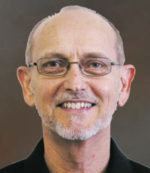 I don’t know what you were doing the week of Aug. 15, but I had a ring-side seat, watching a bit of local history right before my eyes. The Medicaid 23 trial took place just a block from my church office, at the courthouse in downtown Jefferson City, Mo. Medicaid 23 is the name given to the group of mostly clergy arrested in May 2014 for singing in the Missouri Senate gallery and allegedly disrupting Senate proceedings (only 22 were tried last month, since one defendant was unable to appear and will be tried later). They were protesting several years of inaction since our state lawmakers have failed to pass Medicaid reform which would enroll another 300,000 Missourians in health care.
I don’t know what you were doing the week of Aug. 15, but I had a ring-side seat, watching a bit of local history right before my eyes. The Medicaid 23 trial took place just a block from my church office, at the courthouse in downtown Jefferson City, Mo. Medicaid 23 is the name given to the group of mostly clergy arrested in May 2014 for singing in the Missouri Senate gallery and allegedly disrupting Senate proceedings (only 22 were tried last month, since one defendant was unable to appear and will be tried later). They were protesting several years of inaction since our state lawmakers have failed to pass Medicaid reform which would enroll another 300,000 Missourians in health care.
By the way, for the person who says, “Preachers should stick to the gospel,” I would ask you to read any of the four Gospels and tell me if Jesus cares about the 300,000 in our state without access to health-care coverage. And does Jesus care that 700 Missourians die every year for lack of affordable care? Medicaid expansion is not a partisan issue; it is a moral issue.
Early on Monday morning of the trial, our church hosted a gathering, providing coffee and donuts for the defendants and those who came to support them. As people of faith from all over Missouri were gathering in our fellowship hall, I was chatting with one of the defense attorneys who happens to be Catholic. I gave him a crash course on the history of Baptist dissent, how peaceful protest is a part of our DNA going back to Europe and early colonial life here in America. And of course, since all but three of the defendants were African American, I reminded him that historically black Baptist churches have led the way in standing up against systems of injustice. I could be wrong, but I think my Catholic attorney friend was actually impressed (or maybe he was nervous about the upcoming trial and didn’t hear a word I said).
As the time of the trial drew near, clergy and lay leaders marched in joyful yet somber procession from our church to the county courthouse. We sang hymns as we climbed the hill and prayed on the courthouse steps. When it was all done, the 22 defendants were found guilty of trespassing. The double irony was not lost on us. First, how do you trespass on public property? And second, 22 people were convicted for trying to help 300,000.
One sensed that the victory might have felt a bit hollow to the prosecuting attorney. After all, the charges were misdemeanors usually settled through plea bargains and fines without a trial. How gratifying can it be to prosecute a bunch of preachers, some of whom were so frail that they walked with canes and required assistance to stand in court?
Despite the verdict, I believe several wins can be counted. First, the movement for human dignity was energized. Without intending to, the prosecution gave enormous free publicity to the cause of Medicaid expansion. Another win for us was the bonding that happened among people of all races, denominations and political viewpoints. We stood in solidarity that week, arm in arm with one another. It felt as if God was smiling and shouting, “Now that’s what I’m talking about!”
Finally, we were reminded of the power of suffering for a just cause. Such suffering exposes injustice, bringing it into the light of day and naming it for what it is. The Medicaid 23 trial reminds all of us that civil disobedience and peaceful protest are effective precisely because they require risk and courage. I was simply an observer that week in August. But I was thankful to be in the same room with some moral giants who counted the cost and stood tall.
Read More:
Civil rights groups, Baptists creating ‘incredible moment’ in U.S. politics by Jeff Brumley
